Rebbetzin Devorah Fastag, an author, scholar and lecturer in the Jewish community, authored this guest post, which will be published in two parts. This is Part 1/2.
Rebbetzin Fastag lives in Beitar. She is best known for the book "The Moon's Lost Light", explaining how feminine equality and many other changes of the modern era are related to the end of days. Thank you Rebbetzin Fastag.
-Isha Yiras Hashem at Substack
Thanks to X, who sent this email to ishayirashashem@gmail.com.
The Bible's portrayal of Esau is indeed fairly sympathetic.
After a hunting expedition, Esau returned severely fatigued, perhaps close to the point of death, and his brother Jacob took the opportunity to exploit him and demand his birthright.
Then Jacob stole his identity, to swindle a blessing out of his elderly disabled father.
Once his father realized, he was extremely freaked out and suffered greatly.
Throughout this whole ordeal, Esau's own mother turned against him and facilitated Jacob's scheme.
Due to this great trauma, at his deepest point of anguish, Esau had thoughts of killing his victimizer Jacob. Even in his darkest hour, though, he seems to have maintained compassion for his innocent father and decided not to harm Jacob while his father lived.
In spite of his traumatic family life, he nevertheless continued to show great deference to his father, even marrying new wives (sic) that were more to his father's liking. (IYH note: he married a new wife, not new wives. Genesis 28:9)
When Esau next sees Jacob, he doesn't kill him. He doesn't assault him. He doesn't rob him. Instead he tearfully reconciles with him!
After that emotional reunion, Esau wants to join Jacob's clan. Jacob says he's moving a little more slowly and he'll catch up to Esau later. Esau graciously offers to lend his workers to Jacob.
Then Jacob ghosts him and never shows up at the meeting place.
Last we see Esau, he shows up to bury his father, in spite of Jacob's presence there, and needless to say, does nothing negative at that time to Jacob.
This all sounds quite sympathetic to me! [There is no indication that Esau's men were soldiers.]
Dear X,
You are right that a cursory reading of the story of Esau in the Bible looks the way you put it. The story in Genesis, when read on the surface, does not make Esau sound evil. In fact, he sounds even somewhat sympathetic. Esau can be seen as victimized by Jacob, and he seems to care for his father. In fact, the Sages of the Talmud praise Esau as exceptional in the extent to which he honored his father, wearing special beautiful clothing to honor his father. But the text of the Bible is meant to be analyzed and learned, not read superficially, and when one does this, a totally different picture emerges.
Before going into the details of the Biblical account, think: The Torah, known to the western world as the Bible, was written for Jewish readers. It is the Jewish Bible which is making Esau seem like a victim! And yet the same Torah says that G-d took Jacob’s side. Why?
The Torah is totally, painfully, honest, because it was written by G-d, who wants perfection from His people. No ancient human author ever put his own beloved people in such a negative light as the Torah does. Sins are displayed for all to see, faults are criticized, and the people are rebuked. Wars are lost as well as won. Nobody is above the law, not even Moses himself, who is chastised and punished. G-d does not play favorites. Nobody is immune. So if Jacob victimized Esau, shouldn't he have been punished? Why does the Bible say that G-d took Jacob's side? And indeed, it does say that, as we shall soon see.
After receiving the blessings, Jacob is forced to flee from Esau's anger. On the way, G-d appears to Jacob in a prophetic dream, where G-d blesses Jacob, and assures Jacob that He will continue to be with him. There is not a word of reprimand to Jacob for having taken Esau's blessings. (Genesis 28:13-15) Yet later, Jacob is severely punished for a seemingly much lesser offense. (Medrash on Genesis brought in Rashi on Genesis 32:23) Obviously, G-d does not always take Jacob's side.
So why does G-d take Jacob’s side about the blessings?
Isaac does not rebuke Jacob either. After he discovers Jacob's deception, he blesses Jacob again, without any sign of anger or rebuke. (Genesis 28: 1-4)
Why? Doesn't he care that Jacob did something dishonest and wronged his beloved Esau?
And strangest of all, the prophet Malachi says in G-d's name: "...I loved Jacob and Esau I hated". (Malachi 1:2) But in Genesis, it is G-d who can be seen to portray Esau as the poor victim, and Jacob as the extortionist, no? Since G-d makes it very clear in His commandments that one is not allowed to lie or to covet what is not yours, it doesn’t seem to make sense. Why does G-d love Jacob and hate Esau?
To answer these questions, we have to digress a bit, and explain something about the Torah.
◻️
When G-d gave the Torah, He commanded Moses to write part of it, which is the written Bible we refer to here. Other parts were not written down, and G-d said to teach those parts orally. Without the oral explanations, the written Torah is incomprehensible. One of the most obvious examples is where G-d tells Moses, “You shall slaughter from your cattle as I have commanded you", but no command as to how to slaughter the cattle is written in the Torah! (Deuteronomy 12:21)
This is just one example. There are so many laws in the Torah which are not explained clearly, or at all. Practically speaking, there is no way to keep the laws of the Bible without the oral instructions that originally accompanied them.
The same is true for the stories in the Bible. We cannot understand these stories correctly if we don't know what the Oral tradition has to say about them. To give one example: The Torah (Bible) says that G-d told Abraham to leave his birthplace and go to the land that G-d will show him. (Genesis 12:1)
Why? What is special about Abraham? Why does G-d suddenly start talking to him, and telling him to do this? Regarding Noah, we are told that G-d chose him and spoke to him because he found favor in G-d’s eyes, and that he was a wholly righteous man, (Genesis 6:8-9) but nothing about Abraham’s character and good deeds is written before G-d’s command to Abraham, which would tell us why G-d is so interested in Abraham. The Oral Torah, however, tells us a lot.
Abraham’s parents worshipped idols, but Abraham figured out on his own that there is one invisible G-d who created everything. He then spurned idolatry to worship G-d and tried to convince others to do so as well.
He put his life on the line and was ready to be burnt to death for his beliefs. That’s quite a good reason for G-d to choose Abraham, don’t you think? And yet, the written Torah doesn’t even mention it! So you can see, that one really must defer to the Oral Torah in order to understand even the stories in the written Torah.
The Oral Torah is now written in the Talmud. Where does the Talmud, the oral Torah, come from?
As mentioned, much of it was handed down from generation to generation since the time of Moses, who received it from G-d. In addition, Moses gave rules to the sages on how they could deduce the law from different aspects of the verses of the Torah. This was important, because as time went on some of the oral teachings were forgotten and needed to be retrieved by deducing them from the written Torah, according to the rules Moses gave for this. Then, when wars, exile, and persecutions caused much disruption, and there was a real danger of the oral tradition being forgotten, it was decided that it was necessary to write down the oral tradition, together with the conclusions of the sages in what we now call the Talmud.
The same thing happened with the stories in the Torah. Much of the explanations found in the Talmud are traditions handed down from the time of Moses, but some were also deduced by the sages using the rules that were handed down to them on how to deduce what happened from the expressions in the verses.
Because the sages of the Talmud lived in a time period much closer to the giving of the Torah by G-d and the handing down of the tradition by Moses, and because they knew the rules of interpretation, much of which we have forgotten, and because they were extremely righteous and received a very high level of Divine assistance, their revelations contain and inestimably greater understanding of the Torah than anything one could write in later times.
(There are statements by the sages which are not meant to be understood literally, and are often teaching hidden mystical truths, but we aren’t going into that here.)
So now we know that we need the Oral Torah or Talmud and midrashim in order to understand the stories in the Torah, but there is also another matter that needs to be pointed out.
Sometimes the Torah will present a story in a way that makes a certain impression, but when we analyze it further we see that the first impression was totally wrong!
For example, in the story of Joseph and his brothers, the youngest brother, Benjamin, is portrayed as a little brother whom, if he leaves his father, will die. You’d think he’s maybe twelve years old. But when you make the arithmetical calculations from the Torah itself, it turns out that Benjamin at that time was thirty(!!) and he was married with ten children! And all this is not even learned from the oral Torah, it’s right there in the verses themselves, but you have to find the information in different places.
Isaac is also portrayed as a lad at the time that Abraham is told to bring him as a sacrifice. But again, if you make the calculation on the basis of what is written in the Torah itself, it turns out that at that time Isaac was 37!!
Would you have realized this on your own? Probably not, but it’s right there in the Torah. The ages can be deduced by anyone who takes the time and effort to do so.
So getting back to Esau, in order to really understand his story, we have to analyze the verses, and see what the Talmud tells us about them. We will thereby reveal things that we would never have realized on our own, but which truly fit in with the verses.
Let's start at the very beginning, when Jacob and Esau are fetuses in their mother's womb.
Their mother Rebecca feels that there is something wrong, "the fetuses are running back and forth inside her". What's going on? Rebecca goes to inquire of G-d. (Genesis 25:22)
Now, how does one go about inquiring of G-d? No verse explains this! This is an example of why we need the oral Torah to tell us, and indeed it does tell us. It tells us that, at that time there was an institution of Torah learning, which the Sages of the Talmud called the Yeshiva of Shem and Ever.
It was founded by Shem, the son of Noah, and Shem’s grandson, Ever. Although the Torah had not yet been given, there were great bodies of learning that would later be given with the Torah, which were known to Adam. This was passed down to Noah, perhaps from his grandfather Methuselah, and then given over to his son Shem, and Shem’s grandson Ever.
Shem and Ever were extremely righteous people, and Shem was a prophet as well.
So getting back to our topic, Rebecca goes to the academy of Shem and Ever, to ask G-d about her strange pregnancy. What was bothering Rebecca was that, when she passed by the Yeshiva of Shem And Ever, she felt the baby was trying to jump out.
That implied a baby drawn to good. By itself, that was good. Yet when she passed by a house of debased, evil idol worship, she also felt that the baby wanted to jump out! Was this baby good or evil? Shem explained that there were twins inside of her. The oral Torah tells us that Jacob was drawn to Torah, and Esau was drawn to idols.
But how could this be? If someone is born good, why should they be rewarded for being good?
And if someone is born so predisposed to evil, why should he be punished? Do they even have free will? How is this just?
Yes, they did have free will, but they had different tasks to accomplish. Jacob had the job of Adam before the sin of the Tree of Knowledge. G-d created Adam naturally good and his job was to stay that way, not allowing evil to enter him. Adam failed at his task, and Jacob, who even looked like Adam, (Bava Metsia 84a) had to take his place.
For this, he needed to be born good, and then withstand all trials that would taint and/or ruin his natural goodness. He was meant to succeed where Adam had failed.
Esau, on the other hand, had the job of mankind after the sin of the Tree of knowledge, which is to turn one’s evil tendencies into good. For that Esau needed to be born with evil tendencies.
It was actually a higher mission than Jacob’s, because turning evil into good, although very difficult, is even greater than remaining naturally good. And so Jacob and Eisav needed different tools to accomplish their different missions in life.
You, reading this now, should know that you also have your own individual mission. G-d gave it to you, along with the tools you need to accomplish it in this world.
And so as part of his mission, Esau was naturally attracted to evil, which he would need to overcome. To do so, he was given a very strong and powerful nature, that could carry him to victory over the evil inclination. If Esau had succeeded in his task he would have been even greater than Jacob! What Esau could have become is amazing.
But Esau didn't use his tools properly. Instead of directing his strength and power to gain victory over the evil inclination, he used it to gain victory over other people in order to satisfy his desires, thereby turning into a very evil man.
As children, Esau and Jacob’s disparate characters were not obvious, but as we are introduced to the grown boys, we are told that "Esau was a man who knew how to hunt, a man of the field”, and “Jacob was a *tam* (a straightforward person) who dwelled in tents”. Then we are told how their parents differed in their relationship to the two sons. “And Isaac loved Esau because there was hunting in his mouth and Rebecca loved Jacob”. (Genesis 25:27- 28)
The idea that Esau was "a man who knew how to hunt" and that "Isaac loved him because there was hunting in his mouth" raises a number of questions.
When reading the verses, one would automatically think that Isaac loved Esau because he enjoyed the meat Esau brought him. Yet, aside from this being contradictory to Isaac’s righteous character, it doesn’t make practical sense.
Isaac didn’t need the meat Esau brought him. As we see later, they raised animals and could have their own meat without hunting. (Genesis 27:9) Furthermore, hunting is a very cruel sport which Jews by nature abhor.
So why would Isaac, who was one of the founders of the Jews who abhor hunting, want Esau to hunt? Why would Esau’s hunting make Isaac love him? We would think the contrary would be true.
To find the answer, we must analyze the exact wording.
The verse says that Isaac loved Esau because there was hunting in his mouth. In whose mouth – Isaac’s or Esau’s? The Oral Torah says it was Esau’s! Esau hunted his father with his mouth.
He pretended to his father that he was very pious and concerned with keeping the law, asking how one would tithe salt and straw (which don't require tithing). He asked extreme questions to deceive his father into thinking how pious he was, when he was actually already worshipping idols. (Rashi on Genesis 25:27)
Jacob, however, is the exact opposite; he is a *tam*. The word *tam* means someone who is not sharp at deception, who says what he really thinks, someone wholesome. We are also told that Jacob *sat* in *tents*. (The English translations says that he “dwelled” in tents, but the literal Hebrew is that he sat in tents.) Why is the word “tents” written in plural? In how many tents did he sit, and what was he doing there?
Again, the Oral Torah fills us in. Jacob sat in two tents; the tent of Shem and the tent of Ever, where he studied Torah. (Rashi, Genesis 25:27) (Apparently they each had their class in a separate tent.)
But we still need more answers. Even if Isaac was deceived by Esau as to his religious piety, he did know that he was a hunter. He even asked Esau later on to go take his hunting apparatus, to go out to the field and bring hunted game and prepare it for him the way he likes it, so that he can bless him. (Genesis 27:3-4) So again, why does Isaac want Esau hunting?
Isaac knew that Esau had a very difficult nature to overcome. The Talmud says that someone born with a certain nature will be a “spiller of blood”. He can use it for good purposes, such as being a circumciser or a ritual slaughterer, or he can use it to rob and kill people, but he will surely spill blood. (Tractate Shabbat 156a)
Isaac knew that Esau had that nature, and he wanted to make sure that Esau used it to kill animals and not people!
By using his nature in a beneficial way, giving pleasure to his father, thereby fulfilling the command of honoring a parent, Esau could accrue merit.
(According to the mystics, this also helps the animal. The animal soul continues to exist after the animal’s death, and when an animal is used to fulfill G-d’s will, this raises up the animal’s soul, which is very beneficial for the animal.)
So why did Isaac love Esau? Because he thought that he was fulfilling his very difficult mission in life of turning his bad nature into something good, but Rebecca was not deceived. Instead she loved Jacob who was honest and truly cared for the Torah.
And now we can understand why the Torah says that Isaac loved Esau using the past tense, and then says that Rebecca loves Jacob, using the present tense. Isaac at first loved Esau, but when he eventually found out how evil Esau was, he lost that love. Rebecca's love, however was permanent, for it was based on truth.
Next we are told that Jacob made a lentil soup. (Genesis 25:29) Why did Jacob do this? Why was he at home, rather than studying in the tents of the yeshiva?
Again the oral Torah fills us in. Abraham had just died, and the family was home mourning. Lentil soup is fed to mourners, so Jacob prepared the lentil soup to give his bereaved father.
Esau comes in from the field exhausted. He asks Jacob to pour into his throat some of that “red, red stuff” (the lentil soup) because he is tired. Jacob tells Esau to sell him his birthright as the first born.
Esau answers that he is going to die, so why should he want to keep the birthright. Jacob tells Esau to swear to him, and Esau does so. Then Esau eats and drinks, gets up and goes away. After this the Bible tells us: “And Esau scorned the birthright”. (Genesis 25:29-34)
Is this extortion? Let’s analyze it.
When reading these verses, one naturally thinks that Esau says that if he doesn’t get that red stuff he’s going to die, but a closer look shows that this is not what he is saying! Yes, Esau says that he is going to die, but the words “If I don’t get the food” are not there! That’s only our assumption, and it is an incorrect assumption, as we will soon see.
Esau says he is tired. The Hebrew word used there for tired is “ayaf”. “Ayaf” does not mean that one is so exhausted that he is on the verge of death. If he had wanted to say that, Esau would have said that he is “ayaf ad meod”, meaning extremely, extremely tired, or even “ayaf ad mavet” – deathly tired. But Esau never says that, he only says that he is tired. So Esau is tired, even exhausted, which is why he requests that Jacob give him the food, but he is not on the verge of death.
But in that case, why is it that after Jacob tells Esau to sell him the birthright, Esau says that he is going to die, so why does he need the birthright?
Again, the Oral Torah tells us. Esau thinks that the birthright will cause his death!
Let’s go deeper and see what the Oral Torah tells us about this. The day Abraham died, Esau committed three sins: murder, adultery, and idol worship.
Who did Esau murder? Nimrod, king of Babylon, known today as Iraq. Many years earlier, Nimrod had thrown Abraham into a fiery furnace for refusing to worship idols, and G-d saved Abraham.
Well, what's so bad about killing Nimrod? He was a terrible person. Aside from being an idol worshipper, he was a cruel tyrant, and a murderer many times over. It was about time that his attempted murder of Abraham, in the furnace of Ur Kasdim, be avenged.
That's probably what Esau told the world. Only we know that that's not what killing Nimrod was really about. Esau was a master of deception. The Torah tells us that Nimrod was a great hunter. (Genesis 10:9)
The Sages say that Esau killed Nimrod to get his very special hunting clothes.
And this explains why Jacob suddenly wants the birthright. Jacob understood that Esau’s tiredness was coming from his murder of Nimrod, which was not done for altruistic justice but for selfish gain.
Jacob realizes that Esau is not worthy of the special service of G-d that goes along with being the eldest son. He therefore wants to get this position away from Esau who will surely desecrate it, and serve G-d himself in the proper way.
So Jacob tells Esau to sell him the birthright, and Esau asks him what the birthright entails. Jacob answers that it entails serving G-d, as in the temple service. This must be done according to very exact laws, and if one fails in his responsibilities (like getting drunk while on duty) he can incur the death penalty. Esau realizes that this will severely impinge on his lifestyle, so he answers, “If I’m going to die, why should I want the birthright?”
That’s why he willingly sells it to Jacob.
And that is why the last verse says that Esau scorned the birthright. The verse is telling us that Esau didn’t sell the birthright under duress, because even after he ate and drank and got up and went away, he still scorned the birthright. He showed no regrets, not at all. It didn’t bother him, because “Esau scorned the birthright”.
So now we know why G-d loved Jacob and hated Esau. Jacob was honest and truly wanted to serve G-d.
That was why he wanted the birthright. He had no intention of getting Isaac’s blessings. That was his mother’s idea much later on, and Jacob originally tried to refuse it. It had never been part of Jacob’s plan.
Esau on the other hand was a murderer, an adulterer, and an idol worshipper, who scorned the service of G-d.
Continued in part 2. Links will be added after Part 2 is posted.




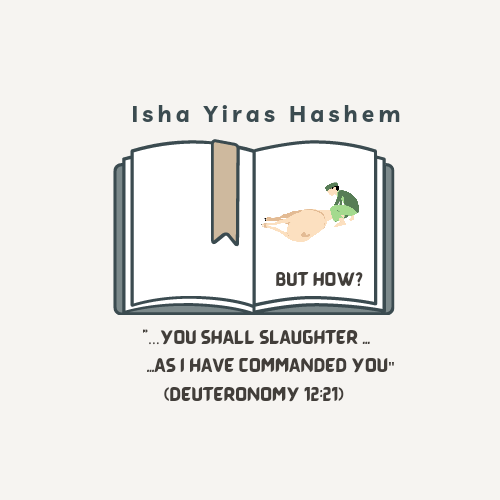
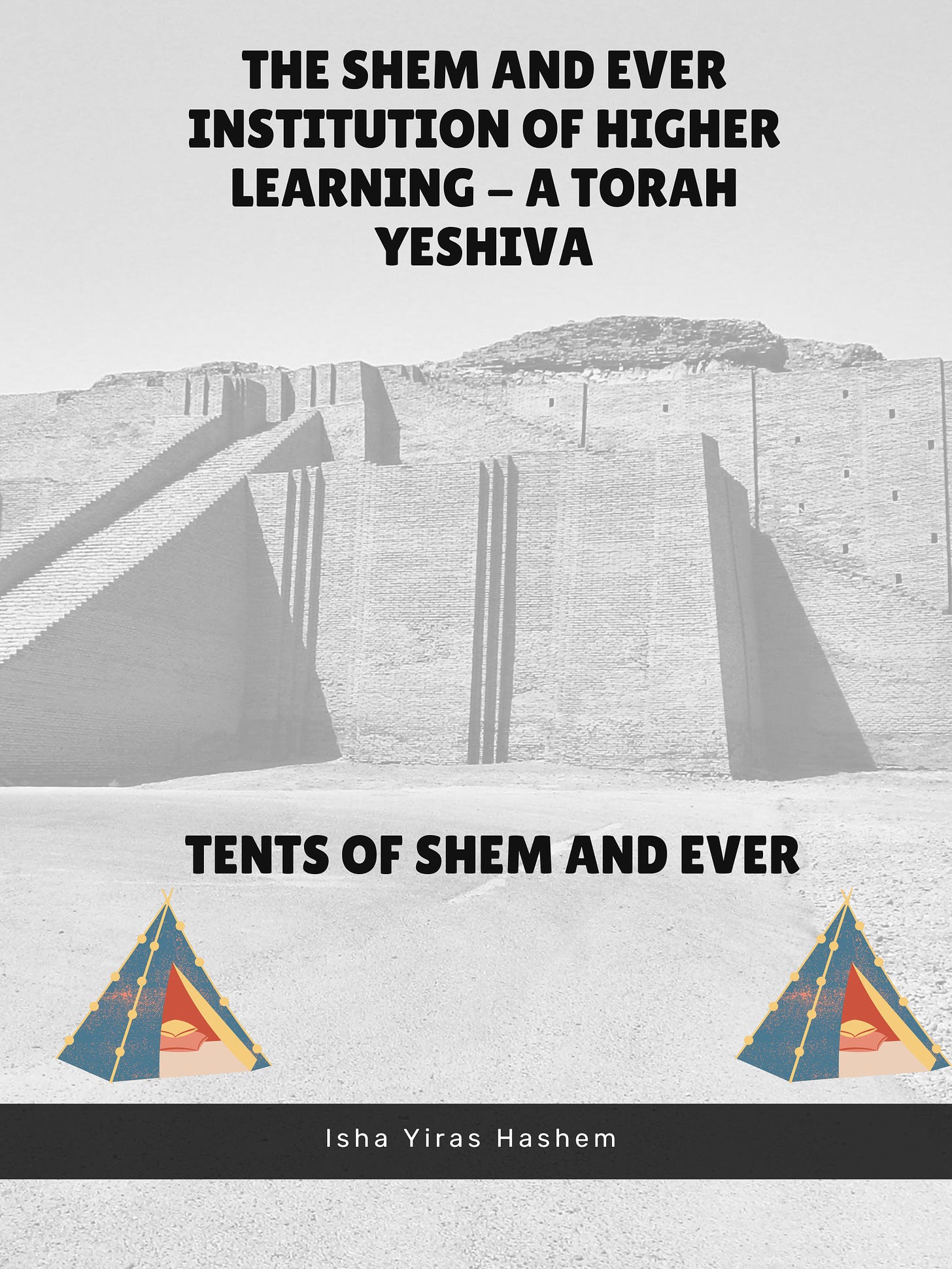
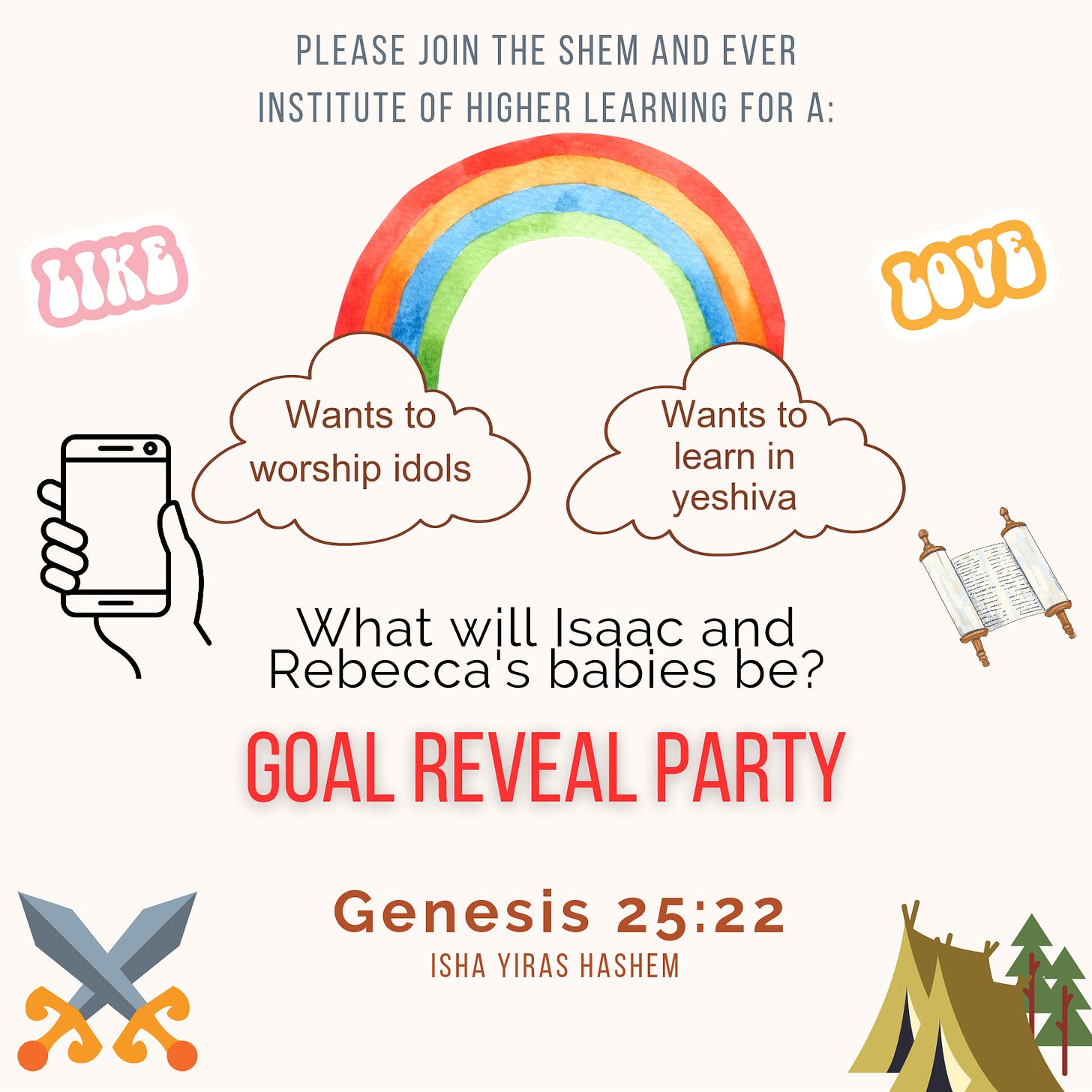

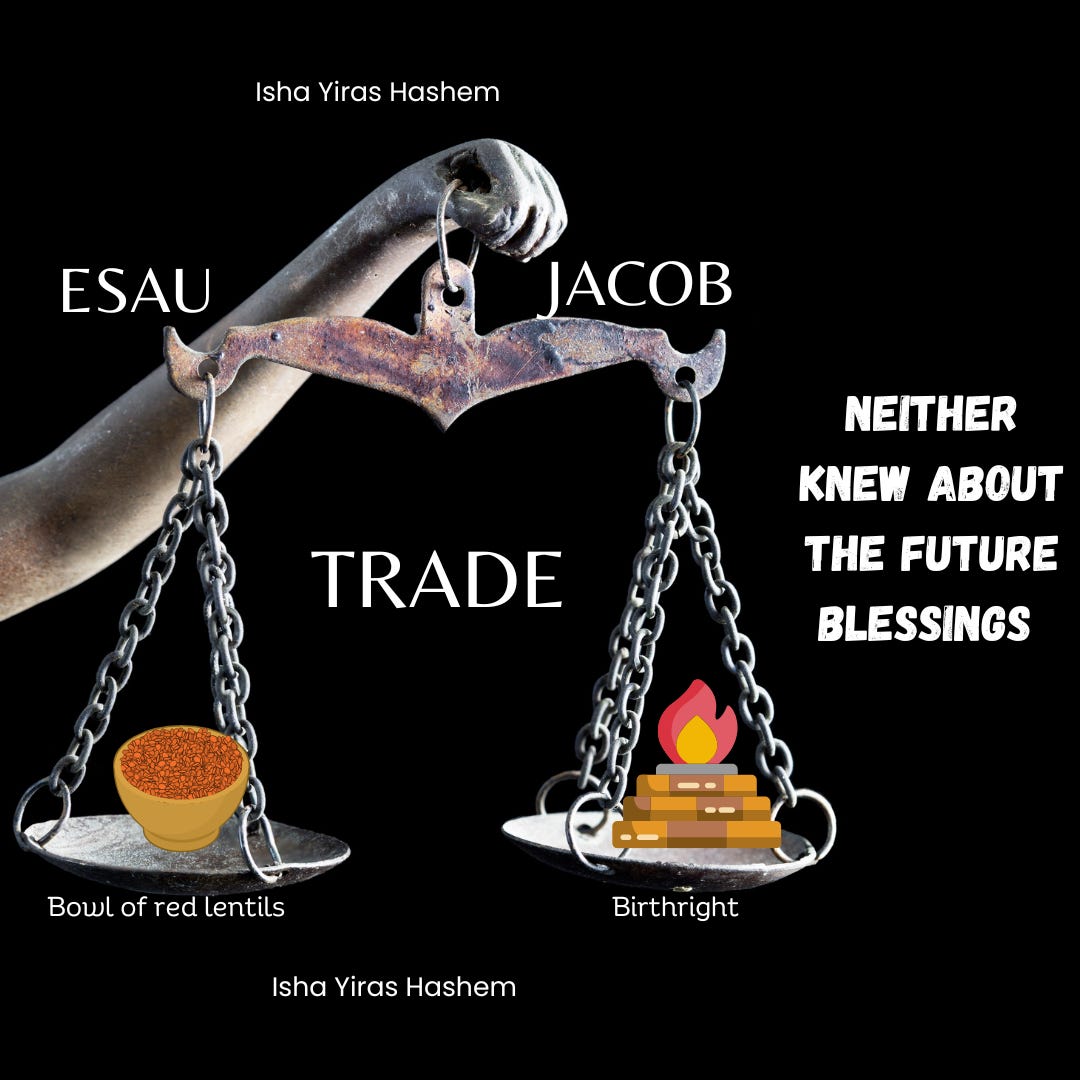
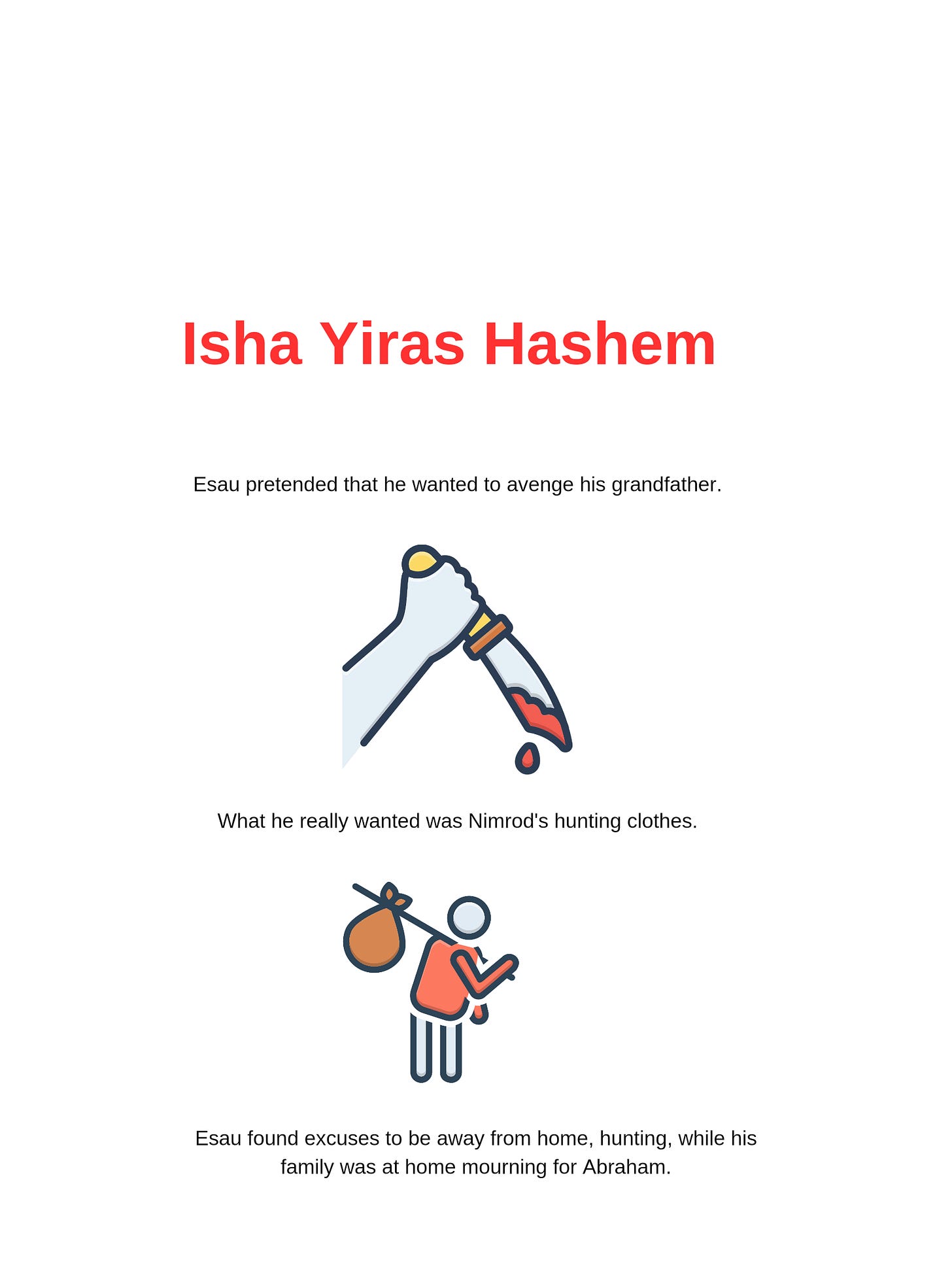
So I have a question. Are there many differences in the Old Testament of a Bible and the Torah or is it pretty much word for word the same?
Well written and easy to understand the points.